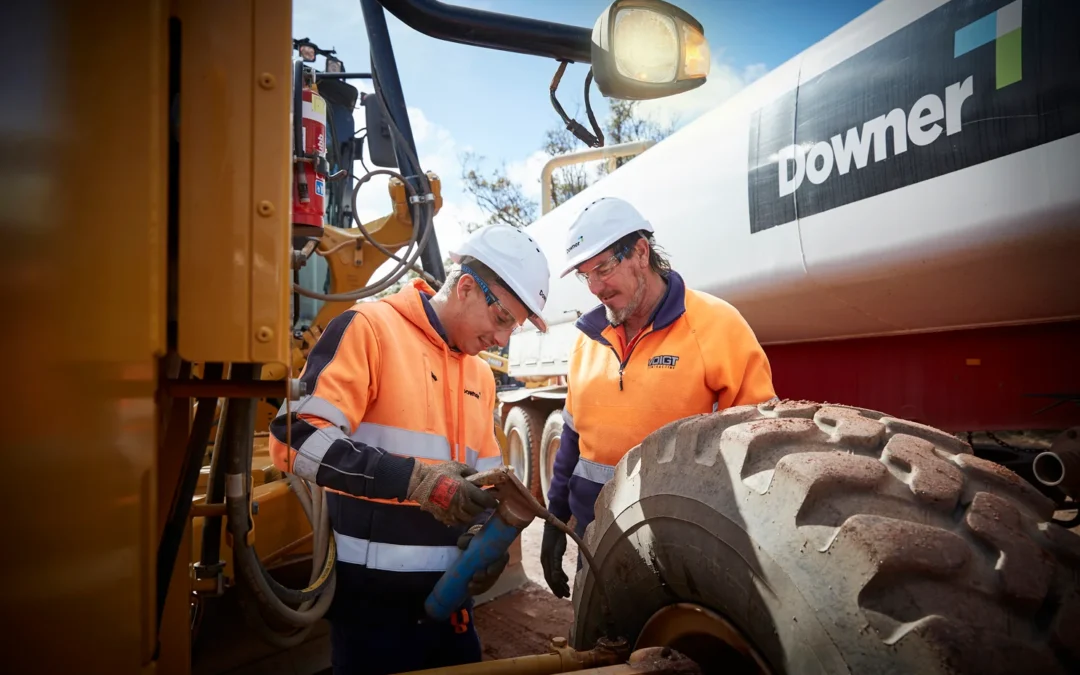Mental health training and education can only be effective when it meets the needs, strengths and interests of its audiences. It then must deliver practical benefits, that improve the supports available to people experiencing mental health problems.
Workplaces provide a unique opportunity to capture people as both givers and receivers of care. However, achieving this within a workforce of over 41,000 employees from diverse backgrounds, is no easy feat. This has been both the challenge and success story of Mental Health First Aid® (MHFA®) implementation at Downer – spearheaded by committed staff and leaders, to achieve sustainable, positive outcomes.
Downer are a large-scale leading provider of integrated urban services across Australia and New Zealand. They deliver everything from road to rail transport, utilities, facilities, and asset management. They support industries and sectors such as education, health and defence. Within their business mix is a broad cross-section of staff from different socio-economic, cultural and lifestyle backgrounds – varying greatly in location, job type, age and gender. From the onset, it was vital that Downer found a preventative mental health training program that could be delivered flexibly on a large scale, while still achieving consistency and quality. They didn’t just stop at the first program they trialled; investigating several options before landing on Mental Health First Aid as their program of choice.
Downer now trains approximately 500 staff, clients and customers each year, and have truly embedded MHFA training into their well-being program in a sustainable way. This has seen measurable benefits for not only their own staff and business, but has had a positive ripple effect in the wider communities where they operate.
From pilot to positive traction
Leading the way at Downer are Tim Black, Group General Manager Wellness & Injury Management, Natasha Palethorpe, Group Health Manager and Donna Viner, Group Health Advisor, who have driven the program since its inception in 2018. They are proud to share their story about the impact and growth created since those early days.
“We ran a pilot in 2015 with 100 people to begin with. The feedback was unanimous that Mental Health First Aid was very practical, user friendly and applicable to the needs of staff, including FIFO (fly in fly out) and DIDO (drive in, drive out) workers, and those from more blue-collar roles. By 2018 we had started to do more pilots across divisions. We quickly moved from having to seek out and recruit participants, to being positively overwhelmed with demand for the courses,” explains Natasha.
One of the keys to gaining this traction was to ensure buy-in at all levels of the organisation. Downer realised that they needed championship from senior management, and they secured this by working with Julie Wills, Head of Sustainability at Downer who supported their recommendation of an externally accredited, training program, such as Mental Health First Aid.
This internal partnership led to the establishment of the Group Health Function, now managed by Natasha. This bespoke team has been strategically constructed to meet the unique wellbeing goals of the business, its workforce and their broader stakeholder network. The team focuses on holistic well-being. This falls within the organisation’s over-arching zero harm strategy, which proactively addresses a full range of health risks that employees may experience in the course of their work and life.
“We needed a program that was evidence-based, valued and reliable, and that provided prevention and intervention, not just a reactive response to crisis. We loved that MHFA training matched the current health landscape to address common issues such as depression, anxiety and substance use problems, while also touching on rarer occurrences such as psychosis.
This really equips people to handle any situation they are presented with, how to support a colleague and getting them to the right professional.”
Natasha Palethorpe, Group Health Manager, Downer Group
Not without challenges
Mental health remains a complex and often confronting topic, presenting myriad challenges for workplaces. Organisations are increasingly aware that inaction to address mental health, can lead to negative impacts on staff safety, well-being, performance, output and morale. This only serves as a greater impetus for preventative education and training.
“We found during the pilot stages that while people were incredibly hungry for the program at all levels, there was still a prevailing stigma around mental health. Staff at all levels, particularly in management, were also a little fearful about what the program might look like and whether it could be practical in a work environment. We decided to overcome this from the top down. Having the executive and board buy-in to the program and commit to the mental health journey, helped us drive the initiative in a way that met business needs,” explains Natasha.
Another challenge for the group was to meet the needs and organisational sub-cultures within their different businesses, divisions, and projects across two nations. They worked with Mental Health First Aid Australia on solutions such as adapting curriculum support materials to include case studies and scenarios relevant to different business environments and staff profiles across Australia and New Zealand.
Downer also embraces diversity and equity for staff, recognising that personal and community differences can present unique strengths and challenges for individuals. Tim Black notes that they have worked closely with the Diversity and Inclusion Team to consider culture, language, gender and neurodiversity within their embedding of well-being initiatives. This is always essential to ensuring that workplaces have an environment of mental health safety and genuine support.
The organisation has also been active in the implementation of online training, to overcomes barriers of distance, isolation and time constraints. During the response to COVID-19, a pivot toward this mode of training saw Downer delivering as much as one course per week by the end of 2020. To ensure that this still provides a level of connection and personalisation, internal Instructors will ring every participant for a debrief chat at the end of each course. This provides individuals with the chance to raise any issues or questions they might have in a safe and confidential way. This is a great example of organisational initiative, and the way in which MHFA Instructors can adapt to individual needs and circumstances.

From strength to measurable impact
Downer wanted to ensure that their well-being program had impact and sustainability. It needed to meet business needs, support staff, and demonstrate value. MHFA training has ticked all these boxes. They have implemented rigorous monitoring and evaluation practices, and measured the program’s return on investment. This has included building in program metrics and annual surveys of their MHFAiders™ (staff trained or accredited in Mental Health First Aid). They also survey staff to gauge broader mental health issues, and to identify the benefits of mental health conversations.
“We have noted people are now more likely to raise mental health issues, which enables early reporting and positive support. We can do things like create warm referrals to our EAP. There is also a more open culture, and people are more likely to say ‘ Hey, I’m not doing so well,’ before it gets to a point of being unworkable, and where they put in a worker’s compensation claim,” says Natasha Palethorpe.
The organisation now has a highly active network of over 2,000 MHFAiders who are encouraged to remain connected, engaged, and are offered opportunities to refresh their knowledge and upskill. They have also implemented a program called “Protect” – an internal resilience-based course for emerging leaders who have completed the MHFA course. Participants are encouraged to expand on their skills and embed well-being principles in line with best practice.
“Once we got up over the 5% of staff trained mark, our MHFAiders were reporting far less crisis interventions on the ground. They are able to intervene early, use the resources available to them, and generate referral pathways for staff who are struggling with their mental health.” says Natasha.
Downer initiatives
Some of the initiatives and practices that have enabled MHFA training to be embedded into Long-term culture and practice at Downer include:
- Appointing dedicated staff (registered allied health professionals) to lead well-being initiatives and spearhead mental health first aid. This now includes 3 Master Instructors within the organisation.
- Ensuring that mental health first aid is integrated into the company’s induction, leadership courses, HR practices, annual safety focus and other learning and development courses.
- Appointing MHFA Officers (now totalling 2,500) across different businesses and divisions as skilled, go-to champions for peer-to-peer support.
- Utilising accessible, professionally developed Mental Health First Aid Australia resources to avoid duplication, save time and cost.
- The investment in Downer’s people has also been reinforced with MHFA being included as a formal KPI under Australia’s largest Sustainability Linked Loan (2020).
- Conducting twice-yearly forums to bring staff MHFAiders together to keep the network active, engaged, and enable the sharing of inspiration and ideas.
- Encouraging staff to connect with Mental Health First Aid Australia updates and emails with reminders to keep up-to-date on mental health topics.
- Creating a rolling calendar of well-being engagement events and campaigns to keep people informed and active.
- Developing a Mental Health First Aid corner on the intranet site as a repository of relevant information and tools.
- Moving from a top-down approach to a more holistic, whole-of-organisation approach as the program matured, so that it could become a building block of overall well-being culture.
- Ensuring staff trained in MHFA stay on top of their Refresher courses and accreditation as an essential part of good practice.
When broken down, this list of activities is a clear recipe for successful Mental Health First Aid implementation. This is why Downer have been recognised as a Skilled Workplace under the MHFA Workplace Recognition Program.
While the hard work and dedication is paying off, Tim and Natasha know that mental health is an ongoing priority. They also note that they have the full backing of their executive managers, CEO and Board, who are committed to maintaining the program into the future. They will continue to look for ways to expand, adapt and embed the program so that it remains relevant to a changing workforce.
Tim Black sums up their experience by saying, “It’s great that everyone at Downer have gotten behind Mental Health First Aid, because it’s not just a work-related course, it’s a life-related course. It provides a safe space that you can carry with you inside and outside of your working days. This has a rippling out that has a positive impact on broader communities, which really is lovely.”
Downer are recognised as part of the Mental Health First Aid Australia Workplace Recognition Program. Find out how your organisation can embed best practice MHFA training and wrap-around initiatives.
To find out more about Mental Health First Aid training for your workplace visit workplace.mhfa.com.au
To learn more about gaining recognition within the Mental Health First Aid Workplace Recognition Program visit mhfa.com.au/workplacerecognition



